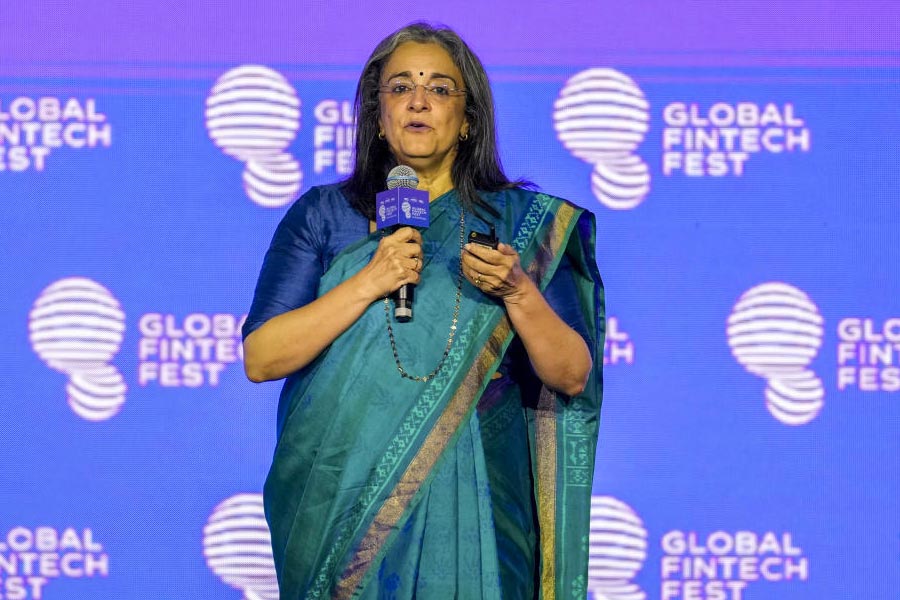The Congress on Tuesday turned up the heat on Madhabi Puri-Buch and the ICICI Group by ripping into the “feeble” response from the country’s second-largest private banking entity to its accusation that the Sebi chairperson had violated all norms by drawing a salary, perquisites and stock option benefits from the banking entity amounting to more than five times what she received from the market regulator between 2017 and 2024.
The raging controversy has raised serious questions about the probity of the market regulator which has been investigating a raft of allegations that US short seller Hindenburg Research levelled against the Adani group in January 2023.
On Monday, ICICI Bank had rebutted the charge that it had paid a salary to Puri-Buch even after she was appointed as a whole-time member of Sebi in April 2017. The bank claimed that the payout was normal retirement benefits she was entitled to.
The bank had claimed that the payout arose from the Employees Stock Option Scheme 2000 and other retiral benefits.
But Congress spokesperson Pawan Khera tore into the ICICI Group’s claims, arguing that it was strange that Puri-Buch’s annual retiral benefits worked out to more than twice her average annual income between 2007 and 2013 when she worked with the group.
“Even if we were to assume that the ₹5.03 crore she received from ICICI in 2014-2015 (soon after her superannuation) was part of her ‘retiral benefit’ and that she got nothing in 2015-2016, why did this so-called ‘retiral benefit’ resume in 2016-2017 and continue until 2021?” Khera asked.
“The average salary drawn by Ms Madhabi P. Buch from 2007 up until 2013-14 (right before her superannuation from ICICI) is ₹130 lakh per annum. However, the so-called ‘retiral benefit’ given by ICICI to Ms Madhabi P. Buch from 2016-17 to 2020-21 averages to around ₹277 lakh per annum. How can a person’s ‘retiral benefit’ be more than her salary as an employee?”
Khera said: “The ICICI Bank’s statement attempts to provide a response but, in reality, ends up giving more information and confirming our charges.’’
“ICICI has helped us in unlayering this expose even further,” he added.
Stock options
The acrimony exploded over the stock options scheme with the Congress challenging the ICICI Group’s contention that Puri-Buch was entitled to exercise her stock options for up to 10 years after the grant.
Employees get to “exercise their options by buying the shares of the company at a pre-determined price that is usually considerably lower than the market price.
Khera busted the banking entity’s claim by fishing out a copy of ICICI Bank Employees Stock Option Scheme 2020 that is available on the website of the US market regulator, the Securities and Exchange Commission (SEC).
The Congress spokesperson claimed that the provisions of the scheme clearly said that a retired employee would have to exercise their stock options within three months of leaving the organisation — and there was no way that the options could be exercised for up to 10 years.
He said the ICICI Bank appeared to have extended special privileges and rights to the Sebi chairperson.
“Where is this ‘revised policy’ — under which Ms Madhabi P. Buch was able to exercise ESOPs eight years after the voluntary termination of her services — officially documented? Why hasn’t the ‘revised policy’ been made publicly available by the ICICI? Why was Ms Madhabi P. Buch allowed to exercise ESOPs at a time when the share price of this company increased substantially, thereby
benefitting her.
“And strangely this benefit that accrued to her coincided with her tenure at Sebi. Wasn’t the market price beneficial to her? Were the ESOPs given to Ms Madhabi P. Buch sourced from the Employees’ ESOPs Trust? If so, isn’t this prejudicial to the interests of other employees of ICICI?”
Khera asked.
In its statement on Monday, ICICI Bank had said that the employee stock ownership plan (ESOP) at the time she was granted them allowed employees to exercise the option up to 10 years from the date
of vesting.
The stock options scheme on the SEC website clearly says that the bank is under no obligation to ensure “uniformity of treatment” of its
options beneficiaries.
Khera also questioned the bank for paying the TDS on the ESOPs on Puri-Buch’s behalf.
“Does it follow the same protocol for all its past and present employees,” he asked, adding that the disclosures over the past two days are just the tip of the iceberg.
Khera was quizzed about the source and authenticity of the data and information that the Congress has started to put out after
Hindenburg Research trained its guns on the Sebi chairperson last month by accusing her of investing in an offshore fund based in Mauritius that also funnelled money belonging to the
Adani group.
Khera responded: “If I have every information right to the last penny, then obviously we have access to some information.
Let her challenge us.
In fact, we challenge her to challenge us.”










